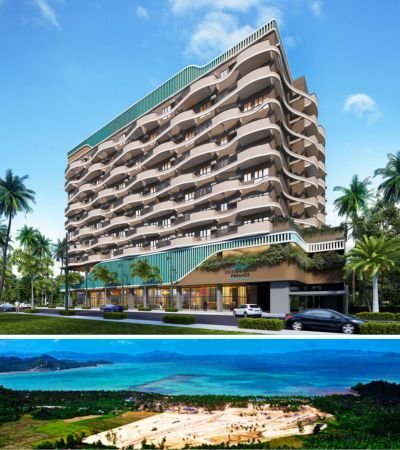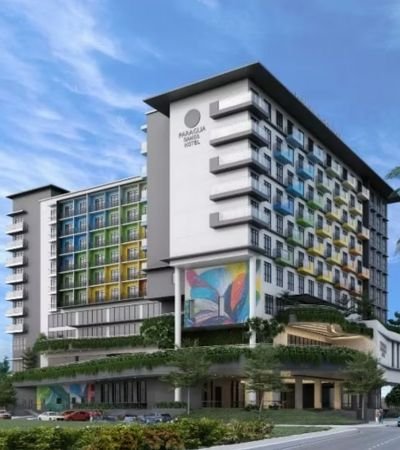Featured Hotel/Condo:

Palawan Property for Sale
Let's Connect!
Looking for the perfect property or ready to make your next big move? Let’s connect and turn your real estate dreams into reality—reach out today!
Featured Hotel/Condo:

Property for Sale in Palawan: An In-Depth Guide to Buying Land, Houses and More
Palawan, often dubbed the Philippines’ last ecological frontier, has captivated people for decades with its unspoiled beaches, lush mountains and diverse marine life. As tourism flourishes and infrastructure improves, the province has also become a magnet for real estate buyers seeking everything from residential lots and beachfront houses to farmland and commercial investments. However, buying property in Palawan is not as straightforward as purchasing property elsewhere. The province’s unique environmental importance, cultural diversity and regulatory landscape require careful thought and due diligence. This comprehensive guide explores the benefits and disadvantages of purchasing property in Palawan, outlines the various types of properties available, and provides practical advice on how to navigate legal requirements and ensure safe, responsible investment.
Why Consider Buying Property in Palawan?
Before delving into the details of property types and legal requirements, it’s important to understand why Palawan is attracting interest from local and international buyers. The province’s allure rests on its natural beauty, growing economy, and potential for lifestyle and investment opportunities.
1. Unmatched Natural Beauty
Palawan’s landscape is a blend of idyllic beaches, turquoise waters, limestone cliffs, lush rainforests and thriving coral reefs. Owning property here means living amidst one of the world’s most celebrated natural environments. Whether you purchase a beachfront lot in a coastal barangay, a home near the mountains or a farmland with fertile soil, you’ll enjoy daily views and experiences that are hard to replicate elsewhere. Many people dream of waking up to sounds of waves or having easy access to a private stretch of beach, and owning property in Palawan can make that dream a reality.
2. Lifestyle Appeal
Beyond natural beauty, Palawan offers a relaxed pace of life. Communities are tight-knit, the air is cleaner and the pace is markedly slower than in major Philippine cities. For retirees, expatriates or anyone wanting to escape the hustle of urban living, Palawan provides peace and tranquility without sacrificing access to basic amenities. Puerto Princesa City has malls, healthcare facilities, schools and airports, while smaller towns like San Vicente and El Nido are developing their own commercial hubs. Owning property in Palawan opens doors to a lifestyle that balances simplicity, community, and modern convenience.
3. Tourism and Business Potential
Palawan has consistently been recognized by global travel magazines as one of the world’s top islands. The influx of tourists creates opportunities for businesses, from resorts and restaurants to retail shops and adventure outfitters. Investing in commercial property, such as a beachfront lot for a future resort or land near popular tourist routes, can yield significant returns. As infrastructure, including airports and roads, continues to improve, the reach of tourism is expanding beyond established destinations. Early investment in emerging areas can lead to substantial appreciation.
4. Agricultural and Sustainable Living
With fertile soil, abundant rainfall and a favorable climate, Palawan offers excellent conditions for farming and sustainable living. Buyers interested in organic farming, eco-friendly homesteads or agricultural ventures can find reasonably priced farm lots with access to water sources. The global interest in farm-to-table dining and organic produce creates opportunities for niche markets. Owning farmland also provides a way to live off the land and be self-sufficient, which resonates with those seeking a simpler, environmentally conscious lifestyle.
Types of Property Available for Sale in Palawan
Palawan’s real estate market includes various property types that cater to different needs and investment goals. Understanding the options helps you align your purchase with your expectations and resources.
1. Residential Lots and House-and-Lot Packages
Residential lots: These are empty parcels of land designated for residential use, often located in subdivisions or individual parcels within barangays. Buyers have the flexibility to build their own home, hire contractors and customize designs. Sizes vary from small lots suitable for single-family homes to larger plots that can accommodate gardens or multiple structures. Residential lots in cities like Puerto Princesa are close to schools, hospitals and shopping centers, while lots in suburban or rural areas offer more space and tranquility.
House-and-lot packages: Some developments offer ready-built homes or townhouses bundled with the land they occupy. These units are often part of gated communities with shared amenities such as parks, security and utilities. House-and-lot packages appeal to buyers who want a turn-key solution without the hassle of construction. They may also come with financing schemes and developer-backed warranties.
2. Beachfront and Coastal Properties
Beachfront lots and houses are among the most coveted properties in Palawan. They provide direct access to beaches, stunning ocean views and immediate value in the tourism rental market. Buyers seeking to build resorts, vacation homes or private villas often target beachfront lots. Coastal properties include land close to the shore but not directly on the beach, offering similar appeal with slightly lower prices. When purchasing coastal property, check the foreshore area regulations, setbacks and easements, as well as tidal patterns and erosion risks.
3. Farm and Agricultural Land
Palawan has large swaths of agricultural land suitable for growing rice, coconuts, tropical fruits and vegetables. Farm lots can be used for commercial production, hobby farming or off-grid living. The Department of Agrarian Reform and local land use plans dictate agricultural classifications, so verify that the property can be legally purchased and developed. Consider water sources, soil quality, road access and proximity to markets when choosing a farm lot.
4. Commercial and Mixed-Use Properties
Commercial lots and buildings are located in strategic areas such as city centers, ports, highways and tourist hubs. These properties are ideal for establishing hotels, restaurants, retail shops, offices or service-based businesses. Mixed-use developments combine residential, commercial and recreational spaces, creating self-sustaining communities. Investors looking to capitalize on Palawan’s growing economy and tourism industry can explore these options, provided they comply with zoning and business regulations.
5. Raw Land and Estate Lots
Raw land refers to unimproved or undeveloped parcels that may be used for various purposes depending on zoning. These properties offer flexibility but require more investment in infrastructure such as roads, electricity, water supply and drainage. Estate lots are large parcels intended for private compounds, boutique resorts or future developments. They may be subdivided or sold as whole tracts. Buyers should be prepared for the cost of initial development and obtaining necessary permits.
Advantages of Buying Property in Palawan
Purchasing property in Palawan has numerous advantages that attract different types of buyers, from homeowners to investors.
1. Potential for Property Appreciation
Palawan’s popularity as a tourist and expatriate destination is driving demand for land and housing. As infrastructure improves, areas previously overlooked are becoming accessible and valuable. Early investors in emerging locations like San Vicente and Roxas may enjoy significant appreciation as the local economy develops. Properties in established areas of Puerto Princesa have also seen steady growth. The finite supply of beachfront and coastal land adds scarcity value, which can translate into higher prices over time.
2. Income Opportunities
Owning property in Palawan can provide various income streams. Beachfront houses can be rented to tourists during peak seasons. Commercial lots can host businesses that cater to visitors and locals alike. Agricultural land can generate income through crop production, agro-tourism or lease arrangements. As tourism and population increase, demand for rental housing, accommodations and services is likely to rise, boosting your property’s earning potential.
3. Lifestyle and Retirement Benefits
Many buyers purchase property not solely for investment, but for personal enjoyment and retirement. Building a home in Palawan means living in a picturesque environment with lower living costs compared to major Philippine cities. The pace of life is slower, the air cleaner and communities more tight-knit. Access to fresh seafood, organic produce and outdoor activities contributes to a healthier lifestyle. For retirees, the cost of healthcare and daily needs is generally lower, stretching retirement savings further.
4. Sustainable Living and Eco-Friendly Projects
Palawan’s commitment to environmental protection makes it conducive to sustainable living. Many buyers seek properties where they can develop eco-friendly homes, organic farms or eco-tourism projects. Off-grid living is possible through solar or wind power, rainwater harvesting and permaculture farming. The opportunity to create eco-conscious spaces that harmonize with nature aligns with global trends and values. Investors can position themselves as leaders in sustainable tourism and development.
5. Community and Cultural Engagement
Palawan’s diverse communities include indigenous groups, fishermen, farmers and entrepreneurs. Purchasing property here offers the chance to engage with local culture and support community initiatives. Many newcomers contribute to community projects, cultural preservation and environmental conservation. This engagement enriches owners’ experiences, fosters goodwill and ensures that development is inclusive.
Challenges and Risks of Buying Property
Despite its appeal, property ownership in Palawan carries certain challenges. Being aware of these risks helps you prepare and mitigate potential issues.
1. Legal and Regulatory Complexity
Palawan’s land classification and regulatory environment is complex. Much of the province consists of forest lands, timberlands, protected areas and ancestral domains. Only land classified as alienable and disposable (A&D) may be privately owned, and classification can change over time. Buyers must verify land titles, ensure that the property is outside protected areas and buffer zones, and check for ancestral domain claims. Failure to do so can result in invalid transactions or future disputes.
2. Environmental Restrictions
Strict environmental laws protect Palawan’s delicate ecosystems. Certain properties may be subject to conservation restrictions, setbacks from shorelines or highlands, or prohibitions against certain uses. Even if a property is outside a protected area, development may require environmental impact assessments and compliance with local ordinances. These requirements can add time and cost to your project but are necessary to preserve Palawan’s natural heritage.
3. Infrastructure and Accessibility
While infrastructure is improving, some areas remain remote or difficult to access. Roads may be rough, water supply limited and electricity intermittent. Properties in rural barangays or off-grid locations may require significant investment to develop basic infrastructure. Transportation of building materials can be expensive. Buyers need to plan for these costs and decide whether the property’s location aligns with their intended use and investment timeline.
4. Potential Land Disputes
Land disputes can arise from overlapping claims, boundary disagreements, inheritance issues or fraudulent titles. In some cases, local customs or informal agreements conflict with formal land registration. Thoroughly investigating the property’s ownership history and ensuring that all documents are genuine protects you from future litigation. Hiring a surveyor to mark boundaries and confirm lot size helps avoid disputes with neighbors.
5. Market Uncertainties
Like any market, real estate in Palawan is subject to fluctuations. Economic downturns, changes in tourism patterns, or policy shifts can affect property values and demand. Overdevelopment in popular areas may lead to oversupply, affecting resale potential. Investors should adopt a long-term perspective and diversify their portfolios to manage market risks.
Understanding Land Classification, Ownership and Legal Framework
The legal framework for property ownership in Palawan is grounded in national and local laws. Familiarizing yourself with these provisions is essential before purchasing.
1. Alienable and Disposable Lands vs. Public Lands
Under Philippine law, the State owns all lands of the public domain. Only lands classified as alienable and disposable (A&D) may be subject to private ownership. These include lands that the government declares suitable for agriculture or housing. Forest lands, mineral lands, national parks and marine reserves remain State property. Many parts of Palawan are forest or unclassified public lands, which means they cannot legally be sold to private individuals. Before proceeding, request a land classification certificate from the Department of Environment and Natural Resources (DENR) or relevant agency to confirm that a property is A&D.
2. Land Titles and Types of Ownership
Original Certificates of Title (OCT) and Transfer Certificates of Title (TCT): These documents prove ownership and show the legal description of the property. OCTs are issued after land registration, while TCTs are issued when a previously registered land changes ownership. Ensure the title is free from liens, encumbrances or adverse claims. Compare the title’s description with survey records to confirm boundaries.
Tax Declarations: A tax declaration is not proof of ownership. It is merely a record of property for tax purposes. Some sellers present tax declarations as evidence of ownership. Always verify that the property has a valid title; tax declarations can accompany titles but do not replace them.
Rights and Possessory Rights: Some properties are sold based on possession rights or ancestral claims rather than titled ownership. These properties may not have clear titles or may be subject to later disputes. Proceed with caution and consult legal counsel before buying properties without titles.
3. Foreign Ownership Restrictions
Foreign nationals cannot own land in the Philippines, but they may acquire condominium units (up to 40% of the total units in a project) or long-term leases. Foreigners can own houses built on leased land, but not the land itself. Some choose to form domestic corporations with Filipino partners to purchase land; however, the corporation must still be at least 60% Filipino-owned. Foreign investors should consult legal experts to structure their investment properly and comply with ownership laws.
4. Ancestral Domains and Indigenous Peoples’ Rights
Palawan is home to indigenous communities whose ancestral domains are protected under the Indigenous Peoples’ Rights Act. Land within these domains cannot be sold to outsiders without strict compliance with the law and the community’s consent. If the property you intend to buy is within or near ancestral lands, consult the National Commission on Indigenous Peoples (NCIP) and local leaders to verify the boundaries and any necessary permissions. Respecting indigenous rights ensures ethical and legal transactions.
5. Protected Areas and Environmental Laws
Protected areas in Palawan include marine reserves, national parks and wildlife sanctuaries. Examples are the Tubbataha Reefs Natural Park, Puerto Princesa Subterranean River National Park, El Nido–Taytay Managed Resource Protected Area and Mount Mantalingahan Protected Landscape. Ownership and development within or near these areas are highly regulated. Construction may be prohibited or restricted, and in some cases, lands cannot be privately owned at all. Always check with the Protected Area Management Board and DENR to see if your property falls within a protected zone or its buffer area.
Steps to Safely Purchase Property in Palawan
With knowledge of the different property types and legal context, let’s explore a step-by-step approach to purchasing property safely in Palawan.
1. Define Your Goals and Preferences
Identify what type of property suits your needs: residential, commercial, agricultural or beachfront. Consider how you intend to use the property, your budget and your timeframe. Knowing your purpose clarifies the search process and helps you evaluate options more effectively.
2. Hire Professionals Early
Enlist the help of a licensed real estate broker who specializes in Palawan properties. Brokers understand local market conditions, available listings and reputable sellers. Hire a real estate lawyer to review contracts, confirm title validity and navigate legal complexities. Consider hiring a surveyor to verify boundaries and a geodetic engineer if you plan to subdivide or develop the land. These professionals protect your interests and help avoid common pitfalls.
3. Conduct Preliminary Research
Gather information on potential properties, including location, size, price, accessibility and existing developments. Visit local government offices to check zoning regulations, future infrastructure plans and community projects. Get insights into the neighborhood, crime rate and environmental conditions by talking with residents or local officials. If you’re buying farmland, examine soil quality, rainfall patterns and water sources.
4. Verify Land Classification and Title
Request an official land classification certificate from DENR or local authorities to confirm that the property is alienable and disposable. Check the Original or Transfer Certificate of Title for accuracy and authenticity. Ensure that the title is clean and matches the seller’s identity. Check for pending mortgages, liens or litigation. If purchasing agricultural land, verify that the sale complies with agrarian reform laws and that there are no beneficiaries or tenancy issues.
5. Check for Easements, Rights of Way and Boundaries
Easements are legal rights allowing others to access or use a portion of your land for specific purposes, such as pathways, drainage or power lines. Confirm whether the property has existing easements. If the property is landlocked, secure a written agreement for right of way from neighboring owners. Conduct a boundary survey to ensure that the physical lot matches the description in the title and that there are no encroachments.
6. Investigate Environmental and Cultural Considerations
Determine if the property is within or near a protected area, critical habitat or buffer zone. Consult the Protected Area Management Board or DENR for restrictions on development. Check for indigenous claims and ancestral domains through the NCIP. If necessary, obtain consent from indigenous communities before proceeding. Evaluate the environmental impact of your intended use and consider how to mitigate harm to ecosystems, such as mangroves, corals and wildlife habitats.
7. Negotiate Terms and Draft Contracts
Once you have verified the property’s status and decided to purchase, negotiate the price, payment terms and any conditions such as repairs or turn-over timelines. Prepare a formal offer to buy or letter of intent. When terms are agreed, draft a Deed of Absolute Sale or Contract of Sale in consultation with your lawyer. Ensure that all relevant conditions, such as transfer of taxes, title processing and remedies for breach, are clearly outlined. For installment payments, consider a Contract to Sell, which details the payment schedule and conditions for title transfer.
8. Process Transfer of Ownership
With the contract signed and payment terms met, pay the Documentary Stamp Tax, transfer tax and registration fees. Submit the Deed of Sale and required documents to the Register of Deeds to transfer the title to your name. Apply for tax declaration transfer at the Assessor’s Office. Depending on the property type, additional permits or approvals (e.g., subdivision plan approval, environmental permits) may be needed.
9. Develop Responsibly
If your intention is to build, consult architects and engineers to design structures that comply with building codes and local ordinances. Secure necessary building permits and environmental clearances. For coastal or beachfront properties, follow setback requirements and adopt erosion control measures. If you are developing farmland, implement sustainable farming practices to protect soil and water quality. Engaging with local communities during development fosters goodwill and ensures your project meets social and environmental standards.
The Role of Licensed Brokers, Lawyers and Other Professionals
Enlisting professional services when purchasing property in Palawan is crucial. Here’s why.
Licensed Real Estate Brokers
Licensed brokers are knowledgeable about local properties, market trends and reputable sellers. They can help you find properties that meet your criteria, schedule site visits and negotiate terms. Brokers are regulated by law, which provides you with a measure of protection. They also have access to networks of developers and property owners, giving you better options than you might find on your own.
Real Estate Lawyers
Lawyers review contracts, confirm the authenticity of titles and ensure compliance with land laws. They provide guidance on ownership structures, particularly for foreigners or corporations. A lawyer can draft legally binding agreements and protect your interests if disputes arise. Because property transactions involve large sums and long-term commitments, legal counsel is invaluable.
Surveyors and Geodetic Engineers
Professional surveyors verify property boundaries, identify encroachments and create accurate maps. They can also prepare subdivision plans or assist with titling processes. Survey reports provide evidence in case of boundary disputes and ensure that you are purchasing the correct parcel of land. For large-scale or agricultural developments, geodetic engineers play a crucial role in land planning.
Environmental Consultants
If your project involves construction or significant land alteration, environmental consultants can assess potential impacts and guide mitigation measures. They help you navigate environmental compliance, obtain permits and implement sustainable practices. In sensitive areas like coastal zones, their expertise ensures that your project aligns with environmental laws and reduces ecological harm.
Investment Considerations by Property Type
Different types of properties come with unique considerations. Here’s an overview of what to expect.
Residential Lots and Homes
Considerations: These properties are ideal for personal use, retirement or rental housing. Choose a location that offers convenience, security and access to amenities. Check the neighborhood’s quality, future development plans and the availability of utilities. For home construction, understand building regulations and consider resale potential. House-and-lot packages provide convenience but may have restrictions on modifications.
Beachfront Property
Considerations: Beachfront property is highly desirable but subject to more regulations. Verify setback requirements, foreshore lease regulations and environmental restrictions. Consider the risk of erosion, flooding and climate change. A beachfront property can generate tourism income, but maintenance costs, insurance and legal compliance must be factored in.
Farm and Agricultural Land
Considerations: Choose land with good soil, water access and road connectivity. Clarify whether the land can be legally sold and if there are agrarian reform beneficiaries. Determine if you need farm workers or managers, especially if you plan large-scale production. Agricultural land can also be used for eco-tourism, agri-ventures or sustainable homesteads.
Commercial and Mixed-Use Property
Considerations: Location is critical. Properties near tourist sites, airports, ports or major roads attract businesses. Check zoning rules and business permit requirements. Consider parking, access to transportation, and competition from existing establishments. Mixed-use projects can offer diversified income streams but may require more capital and management.
Raw Land and Estate Lots
Considerations: Raw land is flexible but requires more development. Assess the topography, drainage, soil stability and environmental sensitivity. Check future infrastructure plans; a road or power line could significantly increase value. Estate lots offer privacy and space for large projects but need thorough planning for subdivision, utility installation and permits.
Responsible and Sustainable Property Development
As Palawan grows, sustainable development is essential to protect the environment and maintain the province’s appeal. Buyers have a responsibility to invest and build wisely.
Eco-Friendly Building Practices
Employ green building techniques such as energy-efficient designs, passive cooling, solar power, rainwater harvesting and wastewater treatment. Use locally sourced and sustainable materials. Incorporate native plants and preserve existing trees to maintain the natural landscape. Design structures that blend with the environment and minimize disturbance to wildlife.
Community Engagement
Include local communities in planning and development. Hiring local workers, sourcing materials locally and providing training opportunities foster economic growth. Engage with indigenous peoples respectfully and share benefits through community projects. Transparent communication, fair agreements and respect for cultural practices build trust and minimize conflict.
Conservation and Environmental Offsets
If your project inevitably impacts the environment, implement offsets such as reforestation, marine conservation, or mangrove restoration. Support local conservation organizations and participate in environmental education programs. Responsible development ensures that economic progress does not come at the expense of Palawan’s ecosystems.
Tips for Encouraging Safe and Ethical Property Purchases
Below are key points to encourage buyers to act responsibly, protect their investments and support Palawan’s sustainable growth.
- Research thoroughly: Investigate the property’s history, legal status, and surrounding environment before making an offer. Due diligence is vital.
- Respect laws and culture: Comply with land classification, environmental regulations and indigenous rights. Ignorance of the law is no excuse and can result in the loss of your investment.
- Work with professionals: Engage licensed brokers, lawyers, surveyors, and environmental consultants. Their expertise safeguards you against fraud and legal issues.
- Adopt a long-term view: Real estate investments require patience. Don’t expect quick profits; instead, focus on sustainability and steady growth.
- Support local communities: Ensure that your project provides economic and social benefits to nearby residents. Inclusive development fosters harmony and shared prosperity.
- Prioritize sustainability: Choose building designs and land uses that minimize environmental impact and align with Palawan’s conservation ethos.
- Stay informed: Keep abreast of changes in local laws, market conditions and environmental policies that may affect your property.
A Balanced Perspective on Property for Sale in Palawan
Palawan’s allure as an investment destination stems from its natural beauty, thriving tourism, and diverse property options. Whether you seek a retirement haven, a beachfront resort site, an agricultural venture or a commercial enterprise, the province offers ample opportunities. However, the very qualities that make Palawan unique also demand careful stewardship. Strict environmental laws, land classifications and cultural considerations exist to protect its fragile ecosystems and communities.
To make a sound property purchase in Palawan, patience and thoroughness are key. Define your goals, understand the legal landscape, and conduct comprehensive due diligence. Seek guidance from licensed professionals and engage with local communities. Factor in potential risks and market fluctuations, and adopt sustainable practices that preserve Palawan’s natural heritage. By approaching your purchase responsibly, you can enjoy the benefits of owning a property in this extraordinary province while contributing positively to its future.
In summary, Palawan’s property market holds tremendous promise, but successful investment requires balance, respect and foresight. Do your research, follow the law, and commit to sustainability. The reward is not only a piece of paradise to call your own, but also the satisfaction of being part of Palawan’s journey toward inclusive and sustainable development.
Top Selling Properties
SanVicente Realty
+63 938 211 [VIEW]





